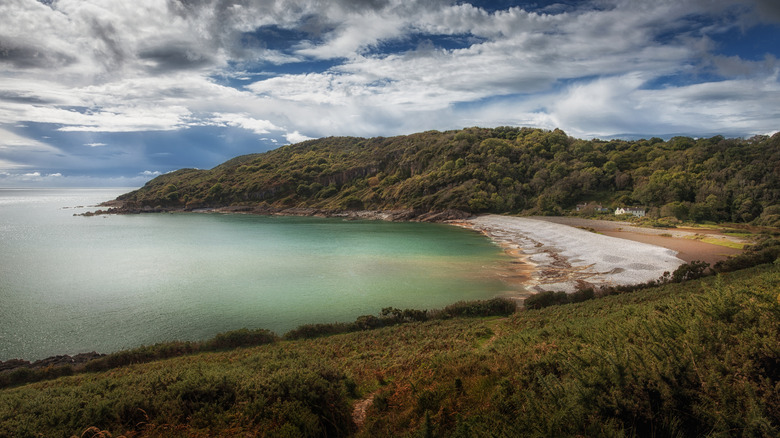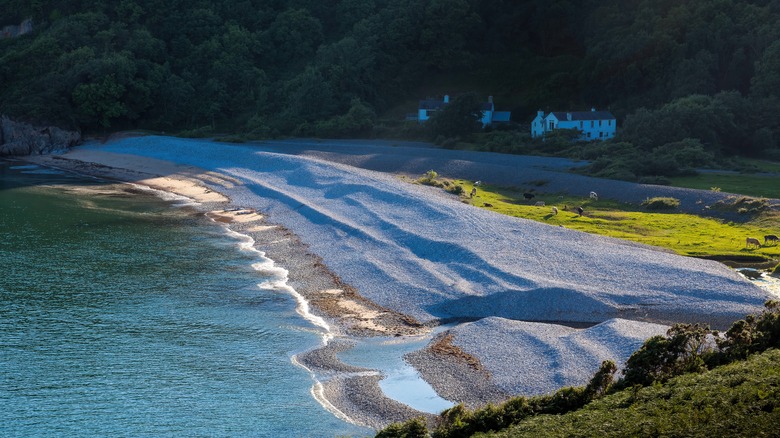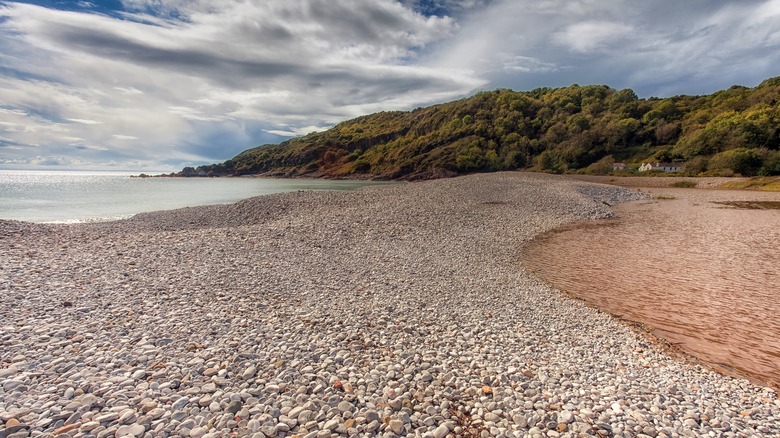This Hard-To-Find Beach In The UK Is The Pebbly, Gorgeous Treasure You Have To See At Least Once
A day at the beach is a euphemism for relaxing, and yet, when a beach is crowded with tourists and you can't find a place to sit, it can be anything but. Sometimes, it's a good idea to go a bit off the beaten path, so to speak, to find just the location you're looking for. If you do a little searching, there are secluded beaches that are hidden gems with mostly just locals visiting. That goes double for a beach that requires a bit of effort to reach. There is one lovely place to visit in Wales called Pwll Du Beach in Pwll Du Bay that fits the bill.
In case you're wondering, it's pronounced similar to "push-dee," and it means "black pool" in Welsh. The one thing to know about this beach, which has a history of smuggling and shipwrecks, is that it's not the easiest to access. If you're up for a bit of a walk, though, it should not be missed. Let's get into all things Pwll Du, a dark corner of the area's history, how to get there, and what activities you can do during your visit.
The history of Pwll Du Bay
This area in South Gower in Swansea is a beach protected by the National Trust (or Yr Ymddiriedolaeth Genedlaethol in Welsh, which you'll see on the signs along with English). It's on the Gower Peninsula, and it was once a limestone quarry in the 19th century. In fact, if you look around the west side of the beach, you can find the remnants of a now-defunct quarry, which you can explore. It's a protected bay, with calmer waters than you might find elsewhere, due to some rock formations on the west side that are referred to as the "Needles." The shore is full of pebbles, though at low tide, a sandy beach appears. The name "black pool" comes from how the pebbles block part of the river that flows into the ocean, turning it into a pool.
This area was once popular with smugglers, as was nearby Brandy Cove. It was also the site of the shipwreck of the Caesar, which ran aground in 1760. While some of the people above deck, including officers, were able to get out, there were 68 "press ganged" men on board (though some accounts say 90 men), meaning they were forced into military service. Those men were locked below deck (which reminds one of a few scenes in the movie "Titanic") and died there. They were buried in a gully on the beach that is now called Gravesend.
How to get to Pwll Du Beach and what to know
Pwll Du Beach is good for swimming, though do note that there are no lifeguards on duty. Because this beach is remote, there is no place to park, no toilets, and no shops. That means you pack in and out, and you'll definitely be swimming (or kayaking, which is possible here) at your own risk. If you bring your dog — and they are allowed there year-round — you should bring in water for them as well. Fishing is also popular, as is sunbathing, particularly at low tide when the sand appears. Do follow posted signs which tell you not to litter or damage any flora or structures.
Since there is no parking, you're going to have to walk or bike in. If you walk from nearby Pyle Corner, Bishopston, which has some shops where you can grab food to bring, it's about a 1.5-mile trek. It's around 2 miles from nearby Kittle or a 2-mile walk from Southgate. The path is packed with rocks and stone, and it's a bit uneven, so biking is only advised for those comfortable with trail biking experience. A walk, however, would be a delight.


